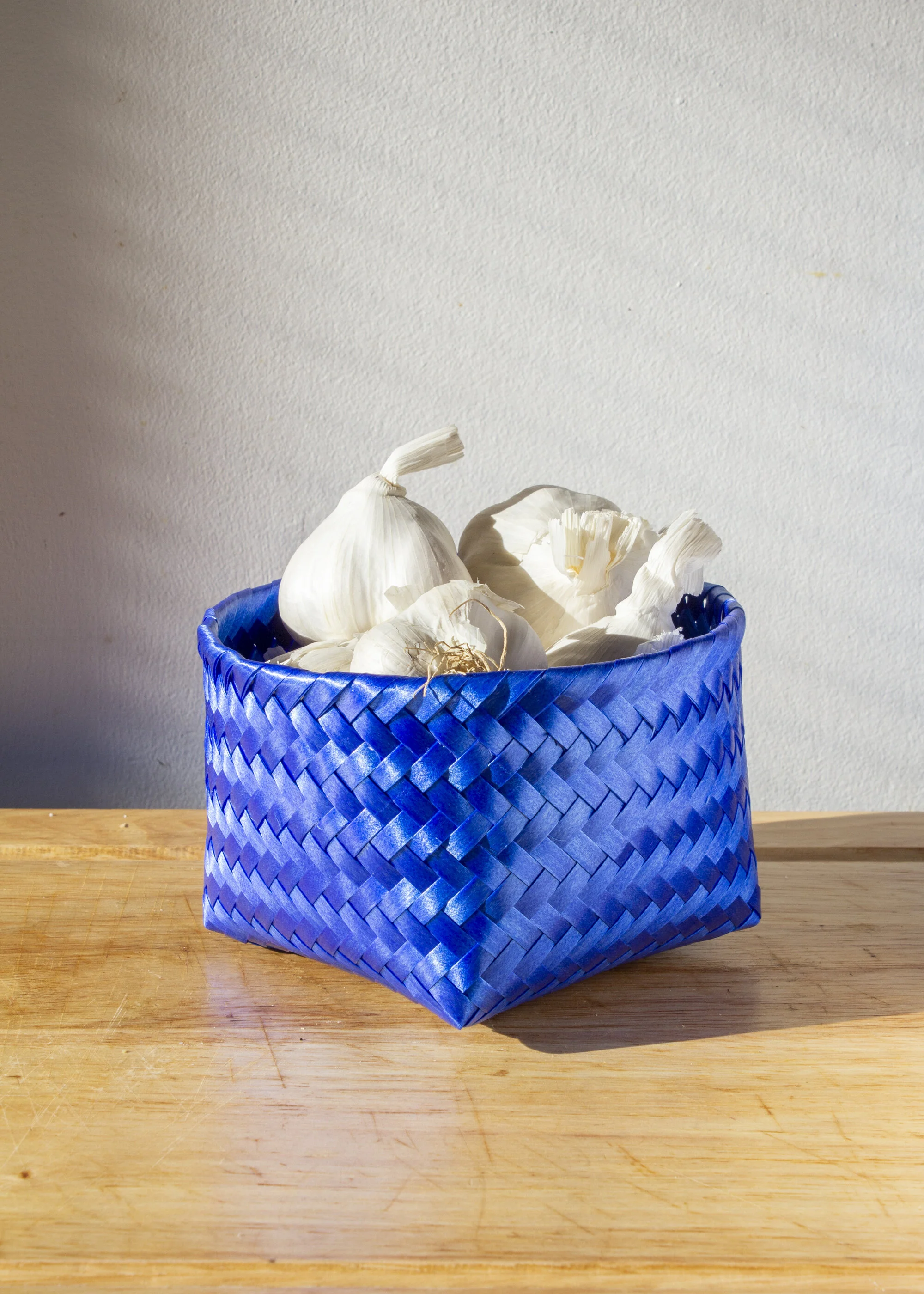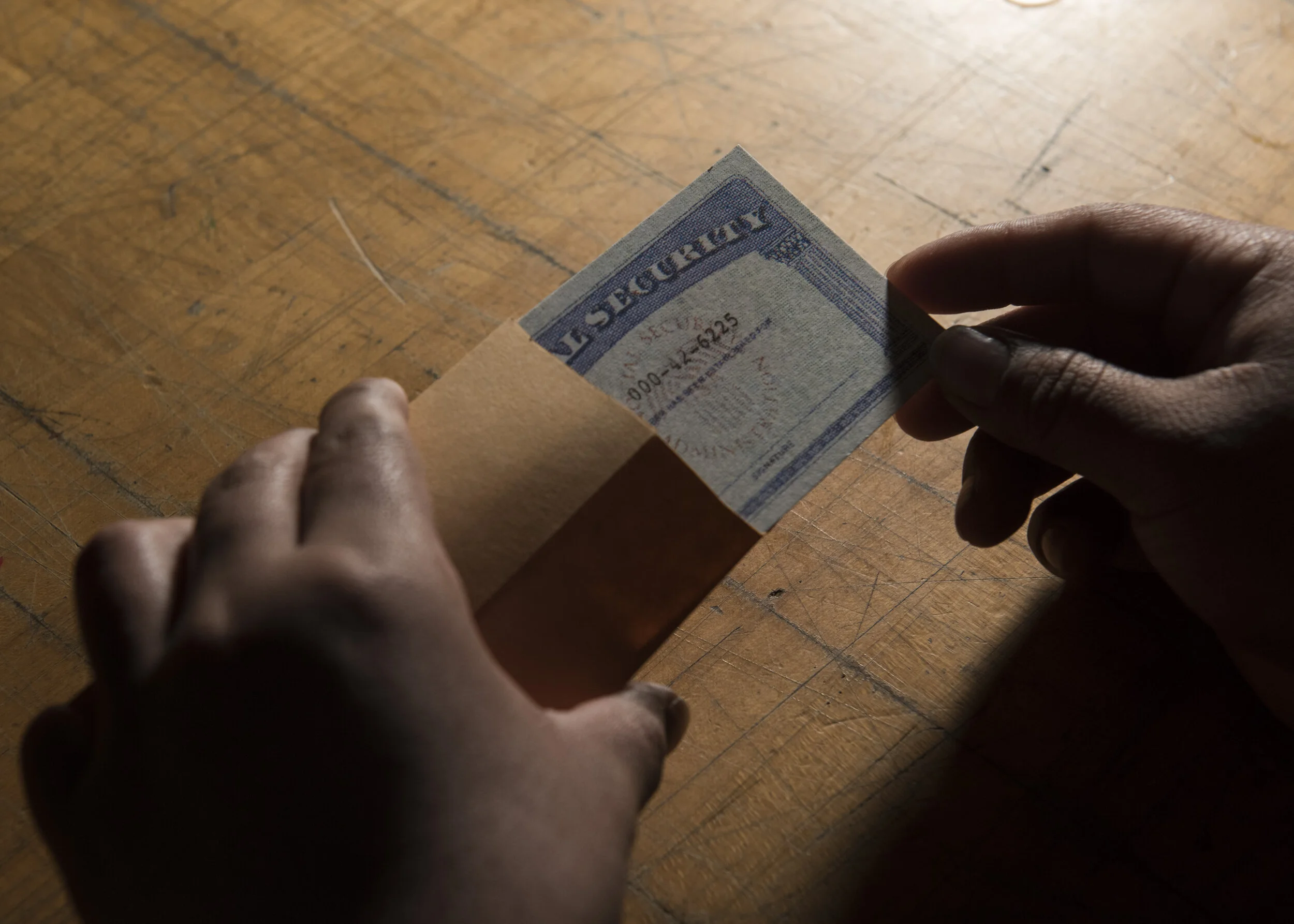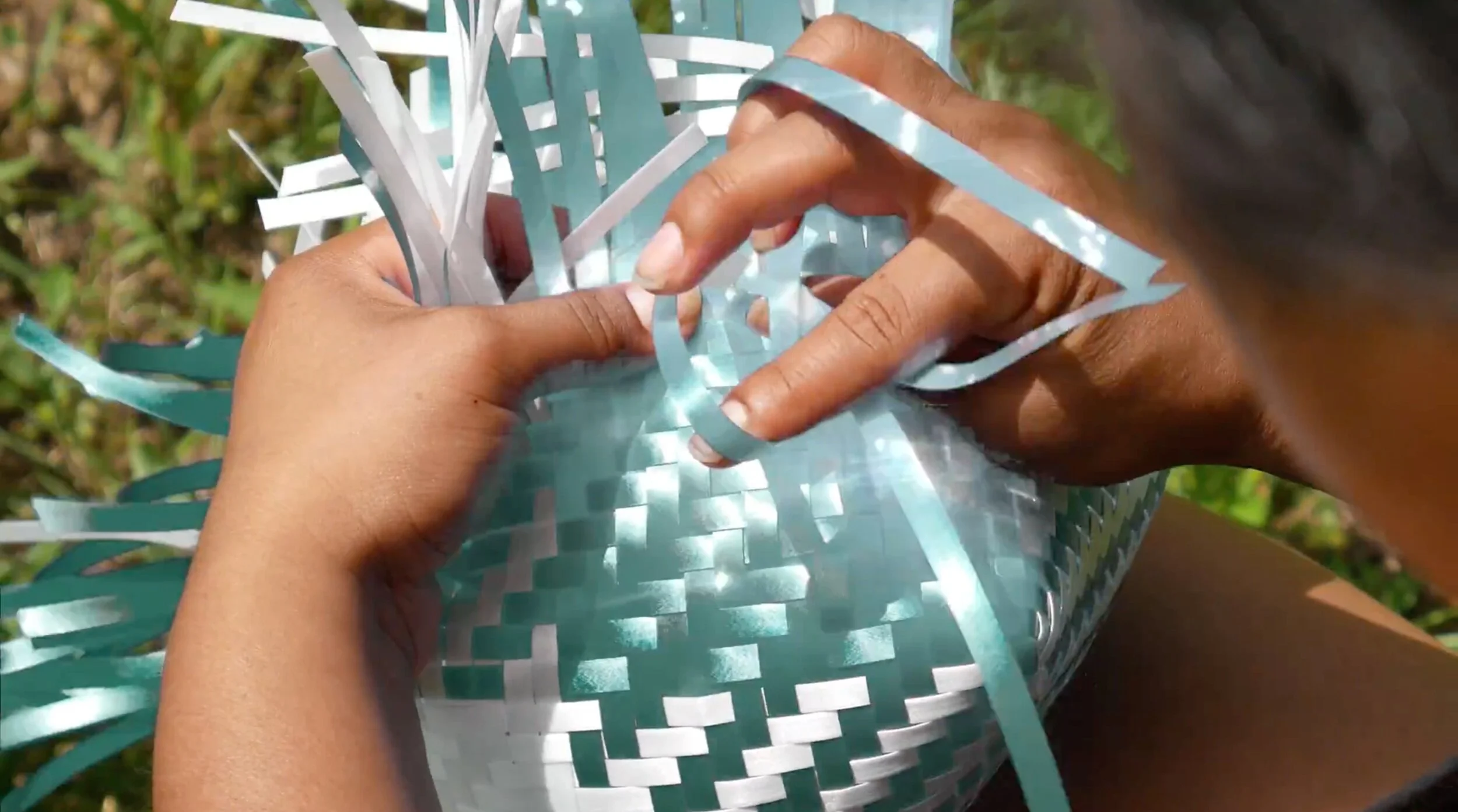Conversation 01: Lorena Cruz
This is a conversation between me and my good friend, Lorena Cruz. Lorena is an artist whose work and values I admire greatly. In this short discussion, we wanted to keep the focus on her hand-woven baskets which she has been selling these past few months. Recently, she purposed 50% of the sales for the Southwest Detroit Mutual Aid Fund to support undocumented families in that area. In addition to baskets, we also wanted to talk about the pandemic—which is just an inevitable topic at this point—and think about the populations most vulnerable in these times. Lorena hails from California and came to the Detroit area in 2017 to pursue her MFA at Cranbrook. Her family takes root in San Juan Mixtepec, Oaxaca, Mexico, and her experience as a first-generation Mexican-American largely informs her work. This is important to mention for many reasons—not only is her art and voice so necessary in such a polarized society, but it also gives voice to multiple groups of people, such as those undocumented families in SW Detroit (which has a largely Latinx population), who may resonate deeply with Lorena’s art, like the fake social security cards she made for a printmaking project in 2016.
I am thrilled she agreed to do this talk with me, while also so sad it was bound by a time limit (which, by the way, I knew from the beginning would be a real challenge for us). There is so much to talk about with Lorena—so much that her art and aspirations bring to an audience’s attention. For the reason that she can spark dialogues lasting minutes or days (and contribute to ones that last months or years) is why I knew I wanted to feature her in this first edition of Pressed Coffee, and why her art-making is valuable beyond her studio walls, and even beyond Detroit.
And yes, I do expect a part II of this conversation.
– Danielle Francisca
The effort by the Southwest Detroit Mutual Aid Fund to raise money for undocumented families in Detroit continues. Please consider donating here.
CONVERSATION WITH LORENA CRUZ (TRANSCRIPT)
Taken place on May 19, 2020
Published May 22, 2020
Danielle: Alright! So…
I imagine this is the part that podcasters over the years have had to really nail down—this introduction to a recording, but luckily we can convert this into a transcript…
Lorena Cruz: Yeah, this can be our first podcast…
D: So, I know I already told you this, but I’ll say it again on record: thank you again for doing this, and for being my supporter and my “guinea pig.”
(laughter)
LC: I’m so excited for this!
D: Yeah! It’ll be cool and I’m also just excited to hear more about you, your practice, and these baskets, which, I have to tell you, everyday I look at mine and I admire them so much! I mean, I have three of them and my place is so small, so my head turns and a basket is just in my view.
(laughter)
That purple one is in my bathroom holding my very few hair ties, which are so sacred to me because there are so few, and I always admire the contrast of the two purple colors and the weaving…
And so you had this really cool fundraiser recently, and I know I’m not the only one who is a fan of these baskets and your art, because you raised $700, I think—is that right? Just about?
LC: Yeah, yup.
D: For undocumented families in southwest (Detroit), so if you want to talk more about what that was and how you got involved, I’d love to know.
LC: I’ve been making these baskets for about a year now, or a little bit more than a year, but I just recently started selling them a couple months ago, and I did this sale with the remaining stock of baskets that I have and donated half of the sales to the Southwest Detroit Mutual Aid Fund that is supporting undocumented families in Detroit. It’s organized by a few women in Detroit, but one of them is Gabriela Santiago Romero, who is a candidate for Wayne County Commission—
D: Oh, cool!
LC: I think there are two other women who have their own histories in Detroit and histories of organizing for undocumented folks in Detroit. And so, I mean, I feel like it started because so much of the panic we’re feeling because of the pandemic has to do with financial issues, and I know I felt my own panic with financial issues because, you know, I didn’t have a job and I wasn’t protected by unemployment benefits, but eventually I was able to qualify for unemployment, and so that made me think more about the populations that aren’t being protected by federal stimulus or federal unemployment. I wanted to do the fundraiser so that we could help the families that aren’t being protected, like the most vulnerable populations that fall through the cracks, basically, of federal aid because of... the government! That we’ve always had and that exists right now. I mean, it’s something that’s supporting the labor force that is basically the backbone of our state and our country…
D: Yeah!! 100%. And I say it all the time, because I get into these discussions about class, and the argument that has to do with identity politics, and class, and how some people say that really we shouldn’t worry too much about identity, and where you hail from and what your blood is, because really we’re all the same class (or should prioritize aligning our working class interests, which I don’t disagree), but I have always stood with the understanding that the Latinx, Mexican groups in this country, in the US, are mostly working class to the point where the two—being Latinx-American and working class—have become so strongly associated. And especially for the fact that so much of the hispanic population in this country is made up of undocumented immigrants—
LC: Yeah...
D: –that are completely exploited and don’t have the security nor the protection that so many of us citizens have.
LC: Yeah!
D: All because of a warped immigration policy, and so much racism in this country and colonialism—the list could go on, right?
LC: And so much of it I feel like has to do with greed, because I think...the scarcity makes us feel like we have to grab whatever we can get…
D: Mhm, and hoard.
LC: Yeah, and so you know I could have definitely increased my own profit by just trying to sell my baskets to benefit myself, but that just to me felt so much like that idea of “hoarding,” when I definitely was in the position at that point to be able to donate half of the sales to this fundraiser rather than trying to be a part of that problem and hoard any sort of income.
D: And that’s super inspiring, and I think what this pandemic has kind of exposed, not just the erroneous stuff in capitalism and the foundations of our government, but it also exposed a lot of positive things, like the fact that people can support other people, even when they are in the same kind of precarious situation, almost. Like, you’re not wealthy!
(laughter)
You don’t have a “job,” like you said, and I don’t either, really—I mean, I have work right now, but I mean, I’ve seen so many people in a certain precarious financial state still go out of their way to help out others in that same state. Kind of like a collective “distribution of wealth,” you could say. (laughing)
LC: It’s an interesting situation, because it’s great to see the middle class and the working class help each other out, but you know, our aspiration should be for there to be a leveling across the board rather than just leveling between the middle class and the working class.
D: I agree. So, how did you hear about the fund—did you have, like, a friend or someone introduce you to this fundraising effort?
LC: So I actually was doing some research before I decided what to donate to. There’s the Undocufund, which I believe started in California to help undocumented farm workers, and that is a much larger fundraiser, but I wanted to find something that was more localized, just so we can focus the money somewhere local, rather than send it somewhere far away. Not that having the money sent somewhere else isn’t gonna benefit anyone, I just—
D: It’s unnecessary, almost…
LC: Yeah. I just wanted to find something that was local, and so I found two funds that were Detroit-based for undocumented families, but I made my decision based on—I don’t know how relevant this is—but I made the decision based on the organization that they were funding through, so one was a GoFundMe, and one was Chuffed, and so I kind of vetted both of them to decide which one seemed like the better option, and to me it seemed like the Chuffed organization was a better choice than the other one.
D: That’s nice you did your research; that gives good faith to people who are supporting you in this effort as well.
Your art practice is obviously beyond just baskets, and you even just mentioned to me that you’re getting into clay working now, so that’s pretty cool, but do you want to talk about what you started off like as an artist and what your practice was like and how it has evolved and how it has definitely been shifting, I assume, under a pandemic, as well?
LC: I started out as a teenager just taking a bunch of photographs because I was really interested in photography, and so when I was in college I decided to declare an art major and study photography, and within my undergrad program I was in at Sonoma State in California, it was a very interdisciplinary art department, so I was able to study printmaking, ceramics, and a few other classes, like drawing, but through the mix of printmaking and photography, I got really into discussing topics of bureaucracy and how it relates to the immigrant experience—
D: Which, you are an immigrant, right? Well, (no, sorry!), you experienced it through your family…
LC: I’m a first generation American, and my parents are immigrants from Oaxaca, so I basically, growing up, witnessed them experiencing the bureaucratic process, and one of my first projects that I did that involved printmaking was dealing with counterfeit social security cards, so it’s kind of always been about basically saying like “fuck you” to that bureaucratic process, and for this project I made fake social security cards that I gave out to people,
D: That’s so cool…
LC: and so my practice has always been surrounding the topics of immigration and my experience as a first generation American, and so now, lately, it’s been more about...it’s still, I think, always gonna be about that experience, but also now I’m kinda turning it towards thinking more about roots and indigenous heritage, and that’s where the baskets come in...
D: You’ve told me before a bit, about where the process of weaving that type of basket comes from, if you want to elaborate on it, I’d welcome that, especially now that it ties into this sort of evolution of your practice as well.
LC: My family, like I said, is from Oaxaca, and we’re from the Mixtec region which is the northwest region of the state, and Oaxaca is a largely indigenous population with Zapotec and Mixtec being the two larger populations. In 2019 of February I traveled to San Miguel Chicahua which is like a small town in Oaxaca, and I stayed with a family friend who had arranged basket weaving lessons for me—
D: Aw!
LC: Yeah, it was really sweet. Actually, the father of the family has lived with my family in California on and off the last ten years, so I stayed with his wife in Oaxaca and they were the most gracious hosts ever and really amazing…
D: That’s super kind.
LC: They introduced me to Doña Benita who taught me how to basket weave over two days!
D: Aw!!
LC: But the reason I wanted to learn was because I was doing these videos where I was braiding my own hair with a green ribbon that turned into a green screen, and so I wanted to continue that weaving practice in my video work, and I wanted to learn the weaving so I could preserve it in the video work and also use it in my video work. Now I’ve been thinking a lot about how baskets and textile weavings have images and designs on them, and so in the still that I’ll provide (below) you can see that there are moving images in the green screen basket, and I want the moving images to be similar to the way that textile weavings have designs on them. In the video work, the video allows the basket to have a moving image, and I want that moving image to continue telling stories about Latinx experiences or indigenous experiences. So that’s where I’m at with the video work, and that’s the main reason I wanted to learn how to basket weave was so that I could create this video work.
D: It (basket weaving) has definitely proven to be useful in so many ways, and it brings a lot of joy to so many people!
(laughter)
So I will admit that I added four minutes to this conversation because it was just too good to try and shorten. I’ll definitely have to do the extra work for it, but I’m really happy that you told me so much, and told the “readers,” I guess you can say—
(laughter)
—told us so much about your personal experience, your art from beginning to now, and everything in between. I appreciate you! If there is anything else you want to add…?
LC: I think I didn’t answer one of your questions…
D: Yes! How has the pandemic affected your work?
LC: I was at a residency (in Oaxaca) in early March, right when everything started to fall apart. There were two really interesting things that happened when I was there: there was this idea of post-truth where a lot of people, like my family members in Oaxaca, didn’t believe that the pandemic was happening because they weren’t seeing people dying and they weren’t seeing people talk about the illness itself, and so it was hard for them to believe it was happening.
Then separately—and we’ve already touched on the topic of labor in this time and essential workers—I was speaking to a Oaxacan woman who was calling all the business owners who were closing their businesses in Oaxaca lazy...Oaxaca City has so many markets in it, and so many people live day to day and make their money off the markets, and she was describing how those business people are lazy because there are people in the markets carrying product and pulling carts that are three or four times their body weight—
D: Right…
LC: And how their bodies are herniating from this really tough labor, and so I think my work has always been about brown hands and the labor of brown hands. I think this just kind of brought it from a different perspective, to think about who is essential and who is doing all this labor, and the effect of the pandemic on them, bringing to light the issues in our system.
D: Yeah, I mean, I think we can also see that happening even here in Detroit and thinking about who are the people being forced to still go into Amazon warehouses, factories, grocery stores, and it’s just a fact that it’s disproportionately certain groups—especially in Detroit—people of color, right?
LC: Yeah
D: And that’s how we see the pandemic and COVID-19 really affecting, majorly, these groups of people as well.
Thank you again, and I just think this conversation goes to show how I need to figure out another platform to provide even lengthier talks…
LC: Yeah! This was great, though, I’m excited.
D: It feels like we only just got into it!
LC: That’s okay, we can continue later...
End.
Lorena Cruz Santiago is a Mexican-American artist from Northern California. You can discover more of her work at LorenaCruzSantiago.com
The effort by the Southwest Detroit Mutual Aid Fund to raise money for undocumented families in Detroit continues. Please consider donating here.
This conversation is a feature of Pressed Coffee 01. If you would like to make an anonymous comment or correction, please fill out this Google form. Note that these comments and corrections may be shared with the readership.
Comments, corrections, and inquiries may also be directed to noxlibrary@gmail.com




